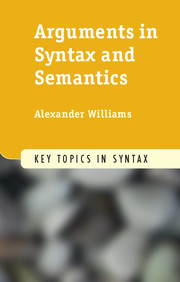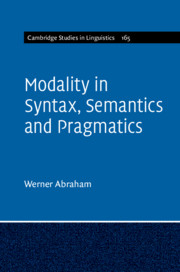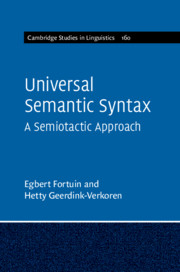Arguments in Syntax and Semantics
$47.99 USD
Part of Key Topics in Syntax
- Author: Alexander Williams, University of Maryland, College Park
- Date Published: January 2015
- availability: This ISBN is for an eBook version which is distributed on our behalf by a third party.
- format: Adobe eBook Reader
- isbn: 9781316235690
Find out more about Cambridge eBooks
$
47.99 USD
Adobe eBook Reader
Other available formats:
Hardback, Paperback
Looking for an inspection copy?
This title is not currently available on inspection
-
Argument structure - the pattern of underlying relations between a predicate and its dependents - is at the base of syntactic theory and the theory of the interface with semantics. This comprehensive guide explores the motives for thematic and event-structural decomposition, and its relation to structure in syntax. It also discusses broad patterns in the linking of syntactic to semantic relations, and includes insightful case studies on passive and resultative constructions. Semantically explicit and syntactically impartial, with a careful, interrogative approach, Williams clarifies notions of argument within both lexicalist and nonlexicalist approaches. Ideal for students and researchers in syntactic and semantic theory, this introduction includes: • A comprehensive overview of arguments in syntax and semantics • Discussion questions and suggestions for further reading • A glossary with helpful definitions of key terms.
Read more- Connects to other work in both syntax and semantics, in the tradition that merges the influences of Chomsky, Montague and Davidson
- Engages intensively with the choice between 'projectionist' and 'separationist' treatments of argument relations, providing the first careful review of this issue
- Incorporates a study of 'implicit arguments', clarifying a topic that is at the center of important debates not only in syntax and semantics, but also philosophy of language
Reviews & endorsements
'This is a superb book, so much clearer than anything I have seen in many years. It will definitely make a mark in the discussion. The author has a remarkable command of both syntax and semantics and is able to provide simple and exact explanations. Anyone familiar with the literature on plurals in particular can only marvel at the simplicity and clarity with which the problems are discussed here.' Marcus Kracht, Universität Bielefeld
See more reviews'This book is not merely a guide to the most important topics in the area of argument structure. It is about understanding theories of argument structure - understanding them deeply. The book is a precious resource for novice linguists and experts alike.' Angelika Kratzer, University of Massachusetts, Amherst
'One of those rare books that will be of use both to the beginner and the specialist. It is a friendly guide through the difficult terrain of argument structure. Much more than a survey, it addresses foundational and current issues in the syntax and semantics of argument structure in an exemplarily clear-headed and even-handed way.' Rajesh Bhatt, University of Massachusetts
Customer reviews
17th Oct 2024 by UName-687307
The book is very useful to students and future generation for sustainable development
Review was not posted due to profanity
×Product details
- Date Published: January 2015
- format: Adobe eBook Reader
- isbn: 9781316235690
- contains: 95 exercises
- availability: This ISBN is for an eBook version which is distributed on our behalf by a third party.
Table of Contents
Abbreviations
Introduction
Part I. Background:
1. Syntax
2. Semantics
Part II. Kinds of Arguments:
3. Arguments in syntax
4. Arguments in semantics
5. Implicit arguments
Part III. Analysis of Argument Relations:
6. Thematic relations
7. Agent and patient
8. Role iteration
9. Separation
10. Event structure
11. Linking and framing
Part IV. Case Studies:
12. Passives
13. Resultatives
Glossary
References
Index.
Sorry, this resource is locked
Please register or sign in to request access. If you are having problems accessing these resources please email [email protected]
Register Sign in» Proceed
You are now leaving the Cambridge University Press website. Your eBook purchase and download will be completed by our partner www.ebooks.com. Please see the permission section of the www.ebooks.com catalogue page for details of the print & copy limits on our eBooks.
Continue ×Are you sure you want to delete your account?
This cannot be undone.
Thank you for your feedback which will help us improve our service.
If you requested a response, we will make sure to get back to you shortly.
×







